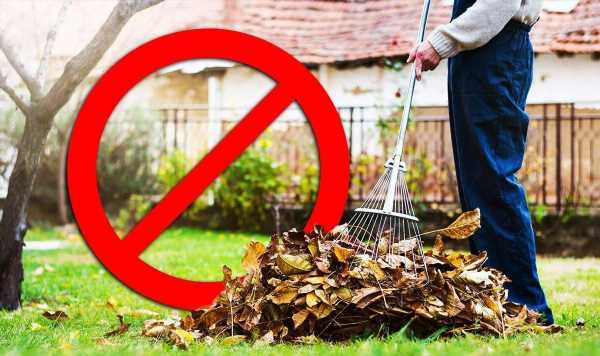Gardening: Monty Don's washing up water tip in dry weather
We use your sign-up to provide content in ways you’ve consented to and to improve our understanding of you. This may include adverts from us and 3rd parties based on our understanding. You can unsubscribe at any time. More info
A council in The Netherlands wants citizens to stop raking fallen autumn leaves to help wildlife. Eindhoven council in North Brabant is urging people to lay down their rakes and leaf blowers to help creepy crawlies over the winter.
Martijn van Gessel, a spokesperson for the council, told The Guardian the town hall wanted to change views of how parks and gardens should look.
He said: “For a long time people were convinced the grass always had to be mowed, the leaves had to be collected, and everything had to look tidy. But in parks, we should let the leaves lie.”
Raymond van de Sande, a manager at landscaping company Ergon, told the same publication: “You let natural processes take their course and you see that there are advantages not just in the areas of ecology and biodiversity but also with fewer weeds, and less need for water in the summer.
“When it rains, there is less runoff to the drains. It creates an entire process of improvements.”


But not everyone agrees with such a scheme, including restaurant critic William Sitwell.
In an op-ed in The Telegraph he said: “There I was, thinking that, come autumn, there was little else as wholesome as raking leaves, when word of the nanny state’s latest infringement of human rights reached my modest rural idyll.
“OK, so the latest break-out of interventionist eco-lunacy comes from the Netherlands, but we all know how these edicts spread.
“One moment a councillor in the city of Eindhoven… suggests residents let fallen leaves lie; the next, a man with a clipboard arrives at your door demanding you hand over your rake.”
READ ABOUT MARTIN LEWIS URGING PEOPLE TO OPEN AN HSBC ACCOUNT


The Dutch city’s move comes after the Government was urged earlier this year to ban all petrol-powered gardening tools by 2025.
Pressure group Challenge 2025 urged then-Prime Minister Boris Johnson to stop the sale of outdoor power tools which cause harm to the environment.
The group said some tools cause more damage than cars.
The Government has already pledged to phase out petrol and diesel vehicles by 2030.
DON’T MISS:
Bungee jump horror as woman fell 150ft to her death [REVEALED]
‘Assassination attempt’ targets death sentence judge [REPORT]
Iran built drones used by Russia with Western help, warns report [LATEST]

Emma Gayler, Challenge 2025 ambassador and marketing manager at EGO, told Express.co.uk: “Without looking at all contributors to air and noise pollution, you can only solve part of the problem.
“Rightly, there is a focus from government on reducing emissions from our cars and homes however seemingly little to no thought is given to the damage being caused by other means, like garden power tools.”
The pressure group published a report last year on public attitudes to petrol-powered garden tools. It showed less than 30 percent knew the tools had a big environmental impact.
Challenge 2025 tested the emissions of popular gardening tools and found petrol-powered leaf blowers emit 11 times more carbon monoxide than a Ford Fiesta car – and need as much as half the car’s fuel tank capacity to operate.

Ms Gayler said: “This clearly demonstrates why much more is needed to educate users on the harm they are doing to the environment, but also potentially their own health.”
Angela Slater, gardening expert at Hayes Garden World, has said raking leaves up from a lawn stops bare patches forming.
She said: “If the lawn is wet and waterlogged make sure you avoid walking over it as this can cause compaction and lead to even greater problems.
“A healthy lawn needs a good even distribution of air pockets to allow the grass to thrive and if the soil is compacted the grass cannot grow and you will be left with soil like concrete and bare patches.
“Rake up leaves as soon as they accumulate on the lawn as they block the light if left, which can lead to bare patches.”
She added leaf-mould can be made by putting the leaves in a black plastic bin bag, squeezing out the air, piercing the bottom of the bag and leaving it in a corner for six months.
Ms Slater said: “After you can use it on herbaceous borders as a mulch and soil improver.
“If you don’t want to make leaf-mould just pile them in an out of the way corner where they will provide a habitat for insects and they will rot down naturally.”
Source: Read Full Article
